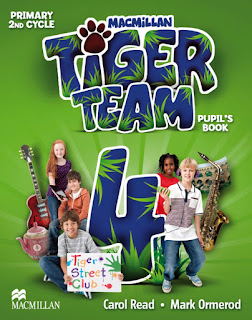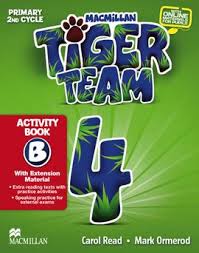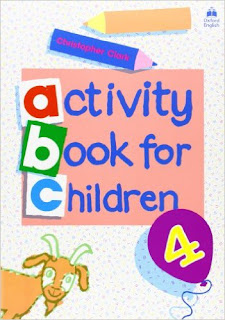ENGLISH 4
Click on the picture and you'll find worksheets to download and print. (Pincha en las imágenes para imprimir fichas)
INCREDIBLE ENGLISH 4
Grammar
TIGER TEAM 3

UNIT 1 A NEW SCHOOL YEAR
Vocabulary
english: inglés
science: ciencias naturales
maths: mates
art and design: plástica
PE: EF
ICT: TIC
geography: geografía
history: historia
music: música
drama: teatro
social science: ciencias sociales
spanish: lengua española
religion: religión
ethical values: valores éticos
Grammar and Speaking
Speak, write and make sentences like these.
I have got (I've got) Art on Mondays. (Yo tengo plástica los lunes)
You have not got (You haven't got) English on Tuesdays. (Tú no tienes inglés los martes)
He/She has (He's/She's got) got Music at nine. (Él/ella tiene música a las nueve)
We have not got (We haven't got) ICT at half past eleven.(Nosotros no tenemos Tics a las once y media)
Answer these questions
Have you got PE on Thursdays? Yes, I have / No, I haven't.(¿Tienes Educación Física los jueves? Si/No)
Has she got History at quarter to twelve? Yes, she has / No, she hasn't. (¿Tiene ella historia a las doce y cuarto? Si/No)
Have we got Science today? Yes, we have / No, we haven't.(¿Tenemos ciencias hoy? Si/No)
What have we got at ten? We've got Maths
(¿Qué tenemos a las diez? Tenemos matemáticas)
Click on the picture and you'll find worksheets to download and print. (Pincha en las imágenes para imprimir fichas)
INCREDIBLE ENGLISH 4
Grammar
TIGER TEAM 3

UNIT 1 A NEW SCHOOL YEAR
Vocabulary
english: inglés
science: ciencias naturales
maths: mates
art and design: plástica
PE: EF
ICT: TIC
geography: geografía
history: historia
music: música
drama: teatro
social science: ciencias sociales
spanish: lengua española
religion: religión
ethical values: valores éticos
Grammar and Speaking
Speak, write and make sentences like these.
I have got (I've got) Art on Mondays. (Yo tengo plástica los lunes)
You have not got (You haven't got) English on Tuesdays. (Tú no tienes inglés los martes)
He/She has (He's/She's got) got Music at nine. (Él/ella tiene música a las nueve)
We have not got (We haven't got) ICT at half past eleven.(Nosotros no tenemos Tics a las once y media)
Answer these questions
Have you got PE on Thursdays? Yes, I have / No, I haven't.(¿Tienes Educación Física los jueves? Si/No)
Has she got History at quarter to twelve? Yes, she has / No, she hasn't. (¿Tiene ella historia a las doce y cuarto? Si/No)
Have we got Science today? Yes, we have / No, we haven't.(¿Tenemos ciencias hoy? Si/No)
What have we got at ten? We've got Maths
(¿Qué tenemos a las diez? Tenemos matemáticas)
Reinforce Activities
- Do and does
- Subjects
- School subjects
- Shool subjects
- School subjects
- Hangman
- Present simple
- To have
- To have present
- To have present
- Telling the time
- The time exercices
- Times exercice
- Times game
- Times game
- Times game
- What time is it?
- What's the time?
- What's the time?
Audio exercise
Stories.
Off to school!
Kung Fu Kids
Verb to have got: Tener
Affirmative
| Forma corta | |||||
| I | have got | I've got | yo tengo | ||
| you | have got | you've got | tú tienes/vosotros tenéis | ||
| he | has got | he's got | él tiene | ||
| she | has got | she's got | ella tiene | ||
| it | has got | it's got | animal o cosa tiene | ||
| we | have got | we've got | nosotros tenemos | ||
| they | have got | they've got | ellos tienen |
Negative
| Forma corta | ||||
| I | have not got | I haven't got | yo no tengo | |
| you | have not got | you haven't got | tú no tienes/vosotros no tenéis | |
| he | has not got | he hasn't got | él no tiene | |
| she | has not got | she hasn't got | ella no tiene | |
| it | has not got | it hasn't got | animal o cosa no tiene | |
| we | have not got | we haven't got | nosotros no tenemos | |
| they | have not got | they haven't got | ellos no tienen |
Interrogative
| Have I got? | ¿Yo tengo? |
| Have you got? | ¿Tú tienes? |
| Has he got? | ¿Él tiene? |
| Has she got? | ¿Ella tiene? |
| Has it got? | ¿Animal o cosa tiene? |
| Have we got? | ¿Nosotros tenemos? |
| Have they got? | ¿Ellos tienen? |
Short Answer
Yes, I have Si, tengo No, I haven't No, no tengo
Yes, he has Si, él tiene No, he hasn't No, no tiene
Yes, she has Si, ella tiene No, she hasn't No, ella no tiene
Yes, we have Si, nosotos tenemos No, we haven't No, nosotros no tenemos
|
thief: ladrón
catch / catching: atrapar
take / taking: coger
call / calling: llamar
arrest / arresting: arrestar
explain/ explaining : explicar
wearing: llevar puesto (ropa, complementos)
flute: flauta
policeman / policewoman: policía
pop star: cantante pop
Books for children
character: personaje
author: autor
brave: valiente
imaginative: imaginativo/a
strong: fuerte
clever: inteligente
poor: pobre
lucky: afortunado
kind: amable
library: biblioteca
join: apuntarse, hacerse socio
borrow: pedir prestado
download: descargar
find out: averiguar
Types of books : tipos de libros:
Children's novel : novela para niños
Fairy tales: cuento de hadas
Play : obra de teatro
Science fiction book: libro de ciencia ficción
Action and Adventure book: libro de acción y aventuras
Mystery: misterio
Horror book: libro de miedo
Comic: comicTravel book: libro de viajes
Poetry book: libro de poesía
Diaries: diario
Project
Write about your favourite book
Example:
Tittle and author
My favourite book is Harry Potter, by J.K. Rowling.
Type of book
It's a series of seven books. It's a fantasy novel, it's a film too.
Your favourite character and description of a character
My favourite character is Harry. Harry is a boy with special powers.He has got short dark hair and glasses. He wears the school uniform. He studies at Howards, a magic school.
MY FAVOURITE BOOK
My favourite book is Harry Potter, by J.K. Rowling.
It's a series of seven books.It's a fantasy novel, it's a film too.
My favourite character is Harry. Harry is a boy with special powers. He has got short dark hair and glasses. He wears the school uniform. He studies at Howards, a magic school. His favourite friends are: Hermione and Ron.
By..............(your name).
Class: ..............
UNIT 3 AROUND THE TOWN
restaurant
park
school
bridge
bank
airport: aeropuerto
harbour: puerto
road: carretera
shopping centre: centro comerical
sports centre: centro deportivo
church: iglesia
swimming pool: piscina
Prepositions
opposite
in front of
behind
next to
Verbo haber
THERE + VERBO TO BE : HAY
THERE IS : THERE'S: HAY UNO/A (SINGULAR)
THERE ARE : THERE'RE: HAY VARIOS/AS(PLURAL)
There´s a shop.(Hay una tienda) .
THERE + VERBO TO BE : HAY
THERE IS : THERE'S: HAY UNO/A (SINGULAR)
THERE ARE : THERE'RE: HAY VARIOS/AS(PLURAL)
There´s a shop.(Hay una tienda) .
Is there a school? (¿Hay un colegio?)
Yes there is. (Si)
Yes there is. (Si)
No, there isn´t. (No)
There are cinemas. (Hay cines)
There aren't hospitals. No hay hospitales)
Are there museums? (¿Hay museos?)
Yes, there are (Si) / No, there aren't (No)
Preguntar y contestar acerca de dónde se encuentran los lugares de la ciudad.
WHERE + VERBO TO BE : ¿DÓNDE ESTÁ/N?
SUJETO + VERBO TO BE + PREPOSICIÓN + LUGAR
There are cinemas. (Hay cines)
There aren't hospitals. No hay hospitales)
Are there museums? (¿Hay museos?)
Yes, there are (Si) / No, there aren't (No)
Preguntar y contestar acerca de dónde se encuentran los lugares de la ciudad.
WHERE + VERBO TO BE : ¿DÓNDE ESTÁ/N?
SUJETO + VERBO TO BE + PREPOSICIÓN + LUGAR
Where is the cinema? (¿Dónde está el cine?)
The cinema is between the shop and the bank.
(El cine está entre la tienda y el banco)
Exercises 2
Exercises 3
Exercises 4
Exercises 5
Exercises 6
Exercises 7
Story
piper: flautista
rats: ratas
town hall: ayuntamiento
major: alcalde
give: dar
go away: irse lejos
follow: seguir
keep a promise: mantener una promesa
adventure story: historia de aventuras
biography: biografía
fable: fábula
enjoyble: divertido
scary: de miedo
silly: tonto
unhappy: infeliz
Tiger team magazine
Types of transport in cities
car: coche
doble decker buses: autobuses de dos pisos
boat: barco
bicycle: bicicleta
underground / tube: metro
tram: tranvía
road: carretera
canal: canal
village: pueblo pequeño
town: ciudad o pueblo grande
city: ciudad grande
cottage: casa
flat: piso
street: calle
neighbourhood: barrio
Project
Write about the place where you live
I live in a .....................(city/town/village).
My city is...............
In my city there are...................................
I live in a.......................(cottage/flat)
I live in .............................street
In my street there are / there is.........................., but there aren't/ isn't ...........................
My neighbourhood is called...........................
I go to school by car / on foot / by bus
My friend lives in........................street.
He goes to school ......................
My dad goes to work by car/ by bike / by bus
Unit 4 Jobs and routines
Jobs
a film star: estrella del cine
a firefighter: bombero
a baseball player: jugador de béisbol
a nurse: enfermera/o
a taxi driver: taxista
a cook: cocinero/a
an artist: artista
a musician: músico/a
a teacher: maestro/a
a clown : payaso
a doctor: doctor/a
a farmer. granjero/a
a baker: panadero/a
a singer: cantanteColoca siempre el artículo a delante de las profesiones.(An si la palabra siguiente empieza por vocal)

Structures
Sentences about jobs. Say the job.
He teaches Maths: Él enseña matemáticas
He works with people: Él trabaja con peronas
She works with animals: Ella trabaja con animales
She helps people: Ella ayuda a las personas
She cooks: Ella cocina
He wears an uniform: Él viste uniforme
She works in a hospital: Ella trabaja en un hospital
She designs clothes: Ella diseña ropas
He works on a farm: Él trabaja en una granja
She cleans: Ella limpia
He paint walls: Él pinta paredes
She drives a taxi: Ella conduce un taxi
Unit 5 Things we like doing
Vocabulary
collecting stickers: coleccionar pegatinas
going to museums: ir a museos
painting pictures: pintar dibujos
using the computer: usar el ordenador
dancing: bailar
shopping: ir de compras
playing frisbee : jugar al frisbee
playing board games: jugar a juegos de mesa
playing golf: jugar al golf
taking photos: hacer fotos
doing exercises: hacer ejercicio
skipping: saltar a la comba
playing cards: jugar a las cartas
talking to friends: charlas con amigos
playing football
playing basketball
playing tennis
playing computer games
rollerskating: patinar
skateboarding: montar en monopatín
playing the violin
playing the drums
playing the piano
playing the recorder
reading comics
riding a horse
riding a bike
in the morning: por la mañana
in the afternoon: por la tarde
in the evening: al anochecer
at night: por la noche
Structures
Para expresar si nos gusta realizar una actividad se usa el verbo gustar(like) en presente simple seguido de un verbo terminado en ing. Ej. I like skipping.
Present Simple
Affirmative
Sujeto + like/likes+ Verbo terminado en ing
I like shopping
You like playing cards
He,She,It likes rollerskating (a la 3º p.s. se le añade s).
We like playing the piano
You like taking photos
They like playing golf
Negative
Sujeto+don't/doesn't+like+Verbo terminado en ing
I don't like shopping
You don't like playing cards
He, she, It doesn't like rollerskating(con la 3º p.s.se usa doesn't y no se añade la s a like)
We don't like playing the piano
you don't like taking photos
They don't like playing golf
Interrogative
Do/Does+sujeto+like+Verbo terminado en ing?
Do you like shopping?
Does he,she,it like rollerskating?(con la 3º p.s.se usa does y no se añade la s cuando va interrogativo)
Do you like taking photos?
Do they like playing golf?
Short Answers
1º p. Yes,I /we do / No, I/we don't
3º p. Yes, he/she/it does / No, he/she/it doesn't
Exercise 1
Exercise 2
Exercise 3
Exercise 4
Exercise 5
Exercise 6
Sentences
Examples
1)Me gusta montar a caballo pero no me gusta hacer fotos.
I like riding a horse but I don't like taking photos.
2) A ella le gusta jugar a las cartas y saltar a la comba por la mañana.
She likes playing cards and skipping in the morning.
3) ¿Te gusta leer comics? Si.
Do you like reading comics? Yes, I do.
4) ¿Le gusta a él montar en monopatín? No.
Does he like skateboarding? No, he doesn't
Translate the sentence
Me gusta tocar el violín pero no me gusta jugar al golf.
A ella le gusta montar en bici pero no le gusta jugar al fútbol.
A mi me gusta hacer fotos y jugar al frisbee por la tarde.
A él le gusta hacer ejercicio y jugar a juegos de mesa al anochecer.
¿Te gusta charlas con amigos? Si.
¿Le gusta a él jugar a las cartas? No.
Unit 6 In the countryside
Para dar órdenes, usa el verbo sin sujeto, ejemplo: Turn right (gira a la derecha).
Si la orden es negativa pon don't delante del verbo, ejemplo:Don't go to the farm (no vayas a la granja).
Turn right: gira a la derecha
Turn left: gira a la izquierda
Go straight on: sigue recto
Turn right at the post: gira a la drecha en el poste
Don't turn left at the bridge: No gires a la izquierda en el puente
Go to the campsite: Ve al camping
Don't go to the lake: No vayas al lago
Go straight on at the bridge: sigue recto en elpuente
Go to the end of the path: Ve al final del camino
Giving directions
Giving directions
Giving directions
Giving directions
Copy and learn
Turn left at the bridge Gira a la izquierda en el puente
Don't turn right No gires a la derecha
Go to the end of the path Ve al final del camino
Do I go straight on? ¿Sigo recto?
Do we go over the bridge? ¿Vamos por el puente?
Turn left at the signpost Gira a la izquierda en el poste
Turn right at the gate Gira a la drecha en la cancela
Go straight on at the farm Sigue recto en la granja
Write about your holidays
My family goes to a camp / a hotel / the beach / the mountains / the countryside /... for the summer holidays.
It's great / great fun / brilliant...
There's a swimming pool / amazing plants / animals / restaurants...
I like swimming in the sea / walking in the forest / taking photos...
When you go don't forget to take photos / take your swimming things /


















No hay comentarios:
Publicar un comentario